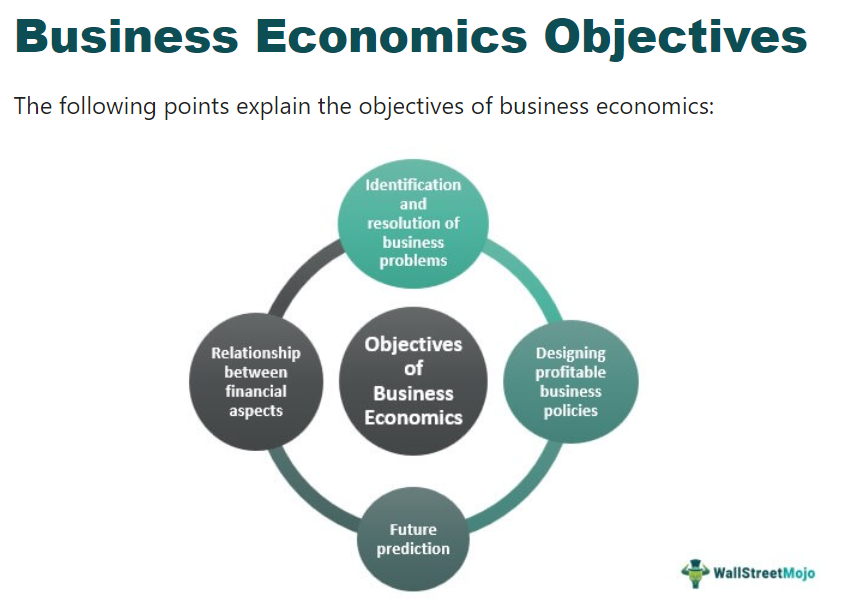Major Challenges Facing Business and Economics in the Post-Pandemic Era
Major Challenges Facing Business and Economics in the Post-Pandemic Era
Blog Article
Comprehending Economic Concepts for Better Organization Decision-Making
In the complicated landscape of contemporary service, a comprehensive understanding of economic principles can substantially boost decision-making procedures. By taking a look at factors such as market frameworks and consumer behavior, organizations can customize their techniques to straighten with affordable characteristics and customer needs. Insights into demand elasticity and opportunity prices offer a framework for enhancing resource allocation. Nevertheless, the application of these economic theories commonly exposes unforeseen challenges and chances that can redefine calculated methods. What implications do these understandings hold for the future of business strategy?
The Fundamentals of Economic Concept
Financial theory functions as the foundation for recognizing how organizations and individuals choose in the existence of shortage. At its core, financial theory takes a look at the allotment of limited resources to satisfy unrestricted wants. This basic principle of shortage necessitates trade-offs, compelling decision-makers to review the costs and benefits connected with numerous options.
Both key branches of economic concept are microeconomics and macroeconomics. Microeconomics concentrates on specific agents, such as customers and firms, evaluating their actions and communications in certain markets. It emphasizes ideas like supply and need, cost elasticity, and market stability, which are essential for comprehending how rates are figured out and just how sources are distributed.
On the other hand, macroeconomics examines the economy all at once, dealing with more comprehensive problems such as rising cost of living, unemployment, and financial development. It offers insights right into systemic phenomena that influence all economic agents, guiding policymakers in crafting effective financial strategies.
Ultimately, a solid grounding in financial concept is necessary for effective service decision-making. By understanding the concepts of scarcity, compromises, and market dynamics, organizations can better browse intricate atmospheres and make educated selections that enhance their competitive benefit.
Trick Economic Indicators
Key economic signs function as important tools for assessing the wellness and instructions of an economy, offering valuable understandings for company decision-making. These indicators are measurable steps that reflect the economic performance and can be classified right into leading, lagging, and coincident indicators.
Leading indications, such as consumer confidence indexes and stock market trends, anticipate future economic activity, allowing organizations to expect modifications out there. Delaying indicators, like joblessness prices and corporate profits, supply insights into the economy's past efficiency, aiding companies to review lasting trends. Coincident signs, such as GDP development and retail sales, rise and fall at the same time with the economy, offering a real-time photo of financial problems.
Recognizing these signs makes it possible for businesses to make informed decisions pertaining to investments, source allowance, and critical preparation. By very closely keeping an eye on these key financial indicators, organizations can browse unpredictabilities and position themselves efficiently in the ever-changing financial landscape, eventually improving their decision-making processes and long-term success.

Market Frameworks and Dynamics
Understanding market structures and characteristics is vital for organizations intending to grow in affordable settings. Market frameworks, extensively categorized into excellent competition, monopolistic competition, oligopoly, and syndicate, substantially influence rates approaches, item differentiation, and competitive actions. Each framework provides one-of-a-kind challenges and chances that can dictate a company's critical direction.
Oligopolies, characterized by a few dominant gamers, lead to interdependent decision-making; firms should Source thoroughly consider rivals' feedbacks to their actions. Monopolies exist when a solitary firm controls the market, resulting in optimal prices power but typically drawing in governing analysis.
Recognizing these characteristics enables businesses to expect market fads, adjust approaches, and optimize resource allotment. Furthermore, identifying how outside aspects like technology and guideline influence these frameworks can enhance critical preparation. By mastering market structures and characteristics, firms can make enlightened choices, eventually improving their affordable setting and driving lasting growth.
Customer Behavior Insights
Consumer habits plays a critical duty in forming service techniques and end results. Recognizing exactly how customers see this make buying decisions, their preferences, and the variables influencing their habits can substantially improve a firm's capacity to meet market needs. Trick understandings right into consumer habits can be obtained from evaluating demographics, psychographics, and behavioral patterns.
Demographic elements such as age, sex, earnings, and education and learning degree supply a fundamental understanding of target audience. Psychographics dig much deeper, discovering consumers' lifestyles, worths, and mindsets, which can affect brand name commitment and product perception. Behavior insights, such as acquiring regularity and reaction to promos, are vital for tailoring marketing initiatives.
Furthermore, external factors like economic problems, social trends, and technological innovations likewise affect customer selections. Throughout economic slumps, consumers might prioritize vital items over luxury products, changing demand patterns.
Using Business Economics to Approach
Insights obtained from customer behavior are instrumental in developing efficient service approaches. By leveraging financial concepts, organizations can much better recognize market dynamics, enhance resource allotment, and improve competitive positioning. Evaluating need flexibility, for example, makes it possible for firms to readjust rates methods to make best use of earnings while remaining eye-catching to customers.
Furthermore, understanding market segmentation allows companies to customize their offerings, guaranteeing they fulfill the specific demands and choices of varied customer teams. Business and Economics. This targeted technique enhances client satisfaction and cultivates brand commitment

Incorporating video game concept into tactical preparation additionally supplies understandings right into affordable actions, enabling companies to expect competing actions and devise counter-strategies efficiently.

Conclusion
In conclusion, a comprehensive understanding of economic concepts significantly improves business decision-making. By analyzing market structures, examining consumer behavior, and analyzing vital economic indications, companies can establish effective techniques that line up with market needs.
In the facility landscape of modern business, an extensive understanding of financial principles can substantially enhance decision-making processes.Leading indications, such as consumer confidence indexes and supply market patterns, anticipate future economic activity, permitting services to anticipate changes in the market. By very closely keeping an eye on these essential financial indicators, companies can navigate unpredictabilities and position themselves efficiently in the ever-changing economic landscape, inevitably boosting their decision-making processes and lasting success.
By leveraging economic principles, services can much better recognize market characteristics, enhance source allocation, and improve competitive placing.In conclusion, a thorough understanding of economic principles considerably improves business decision-making.
Report this page